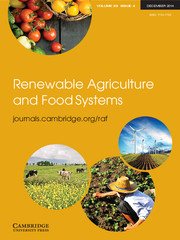Article contents
Meeting the ‘multi-’ requirements in organic agriculture research: Successes, challenges and recommendations for multifunctional, multidisciplinary, participatory projects
Published online by Cambridge University Press: 08 June 2011
Abstract
Organic farming is one of the fastest growing agricultural sectors worldwide, and funds to support research and extension activities that address the needs of organic producers are becoming more widely available in the USA. Solutions to problems in ecologically complex systems, such as organic farming systems often exceed the expertise of individual investigators or single disciplines. Further, the complex nature of ecological and social interactions within systems-based agricultural research requires not only more emphasis on information exchange but also synthesis between multidisciplinary teams of academic researchers and organic farmers. Accordingly, federal grant agencies that support organic agriculture research increasingly require that projects encompass multiple academic disciplines, multiple functions (research, outreach, education), and the participation of stakeholders for the ultimate purpose of the integration of knowledge. Many researchers, educators and administrators at land grant universities (LGUs) remain inexperienced in multidisciplinary, multifunctional and participatory research. Using post-completion project interviews of the project investigators on an organic transition project, we identified eight factors that affected the integration of knowledge from a farmer advisory board and the conduct of our multidisciplinary, participatory organic transition project. The first five factors include shared values, balance in technical competence, institutional capacity for research, team capacity for problem solving and institutional resistance. The research team also identified three other factors that evoked confusion and divergence during the project, and include the ambiguity of power and control of knowledge, the proposed experimental plan and terms of team engagement. We considered participatory elements of the project according to Biggs’ linear typology of participation, but found more appropriate Neef and Neubert's position that a linear scale of participatory approach is an inadequate framework for helping agricultural scientists to decide on whether and in which phases they want to, can and should incorporate participatory elements into their research projects. From these findings, we conclude with critical issues for academic research and extension teams to consider during the development and before conduct of these types of projects. We also offer recommendations for LGUs and other research institutions, and funding organizations, to facilitate multidisciplinary, multifunctional, participatory research.
Keywords
- Type
- Preliminary Report
- Information
- Copyright
- Copyright © Cambridge University Press 2011
References
- 11
- Cited by


